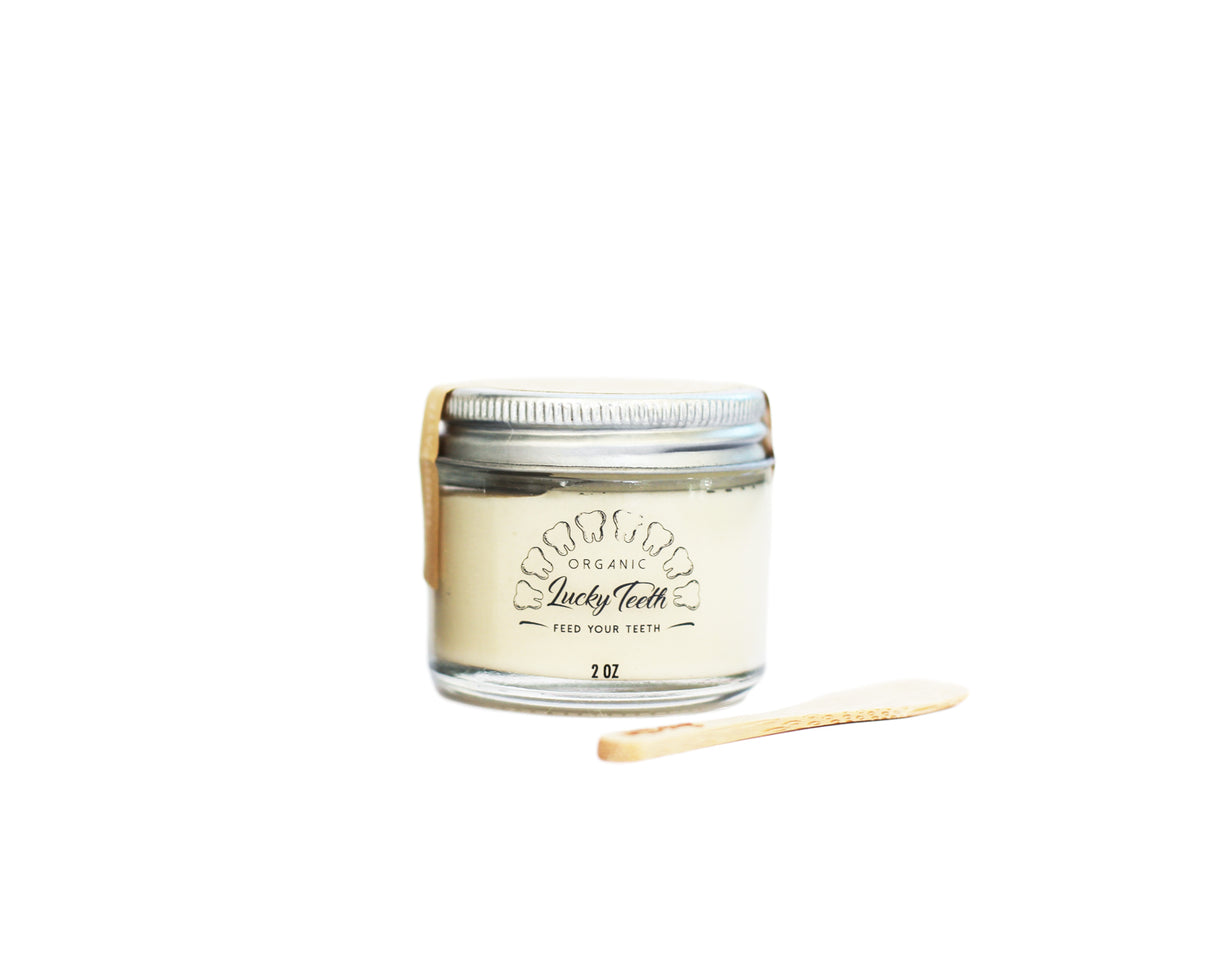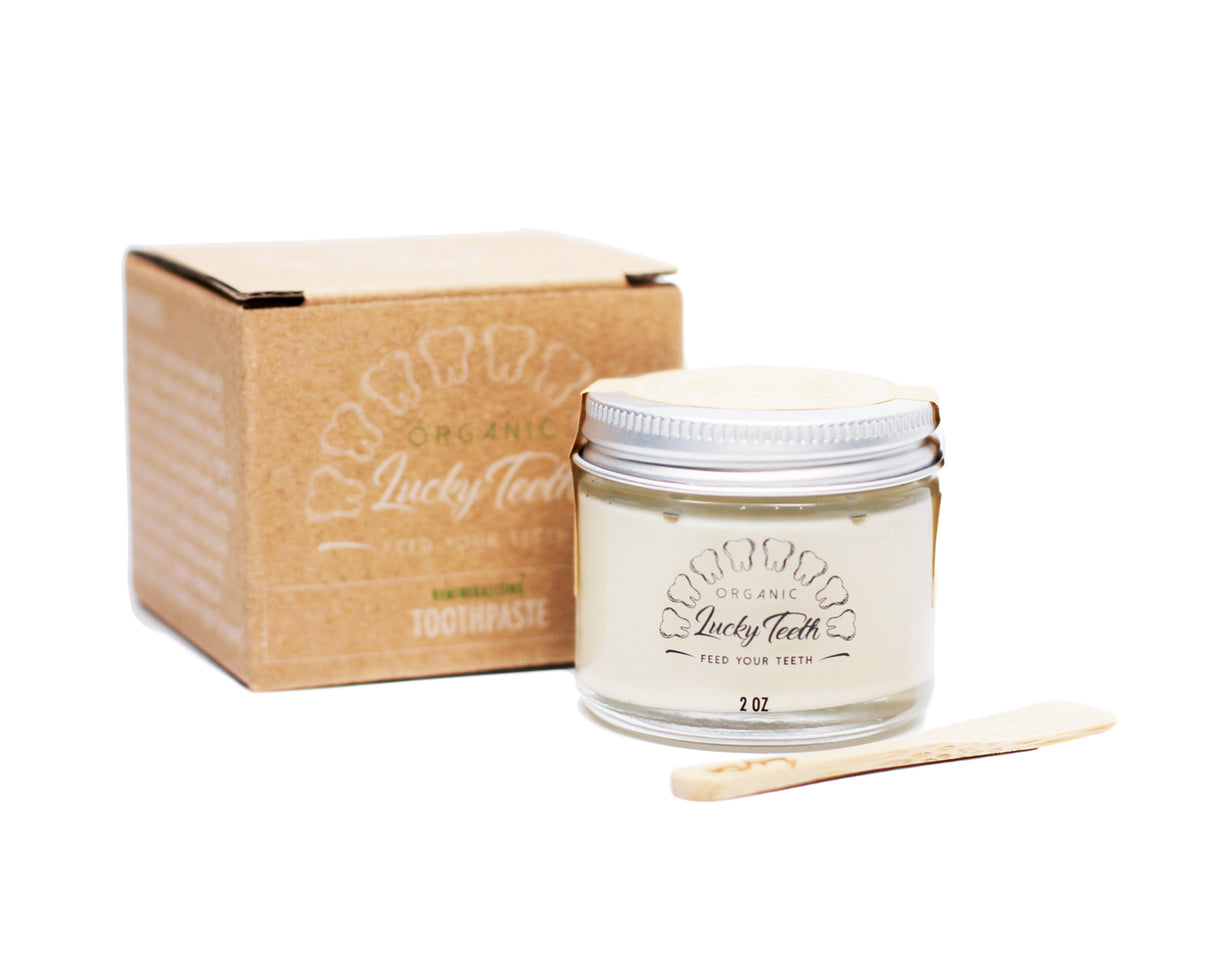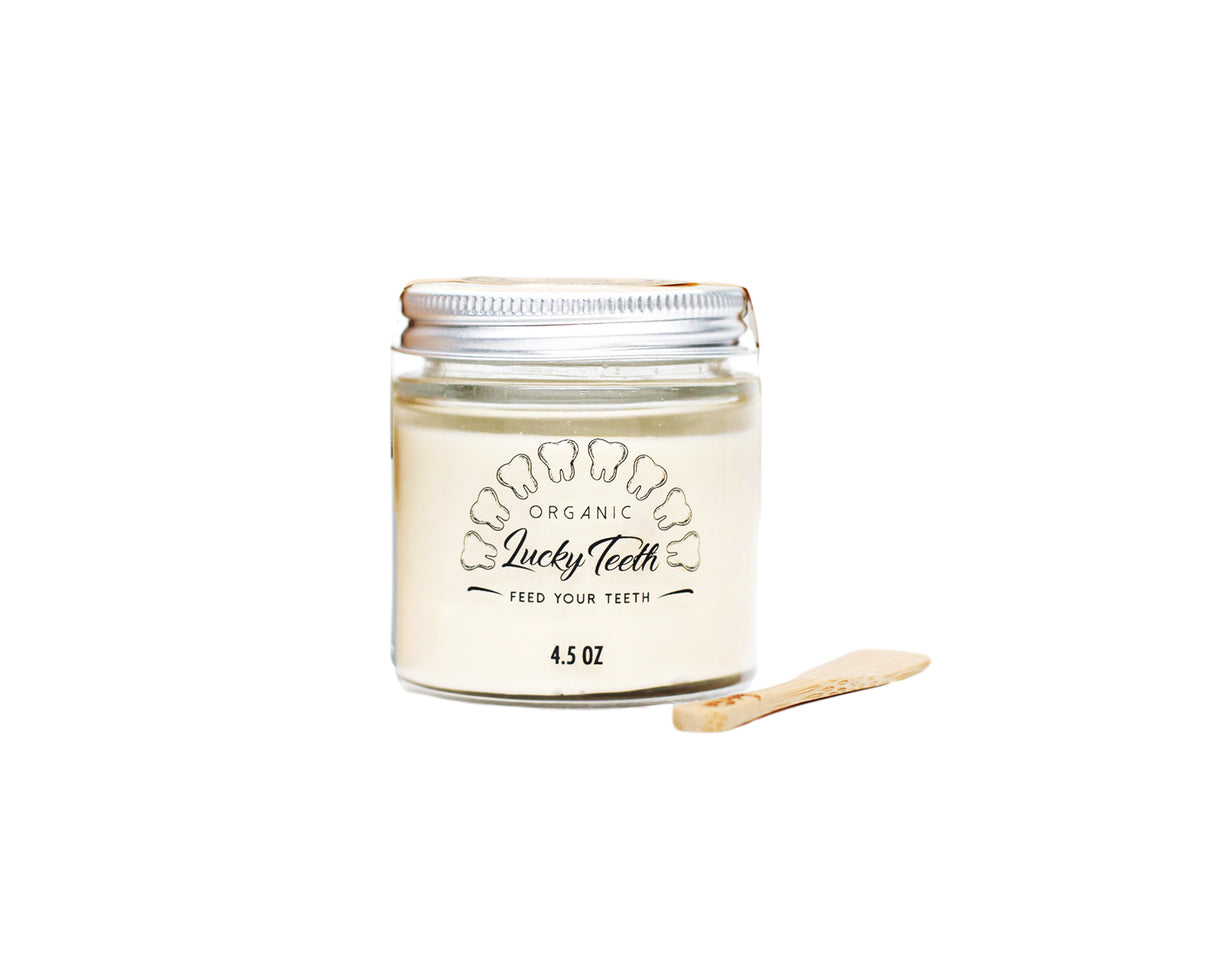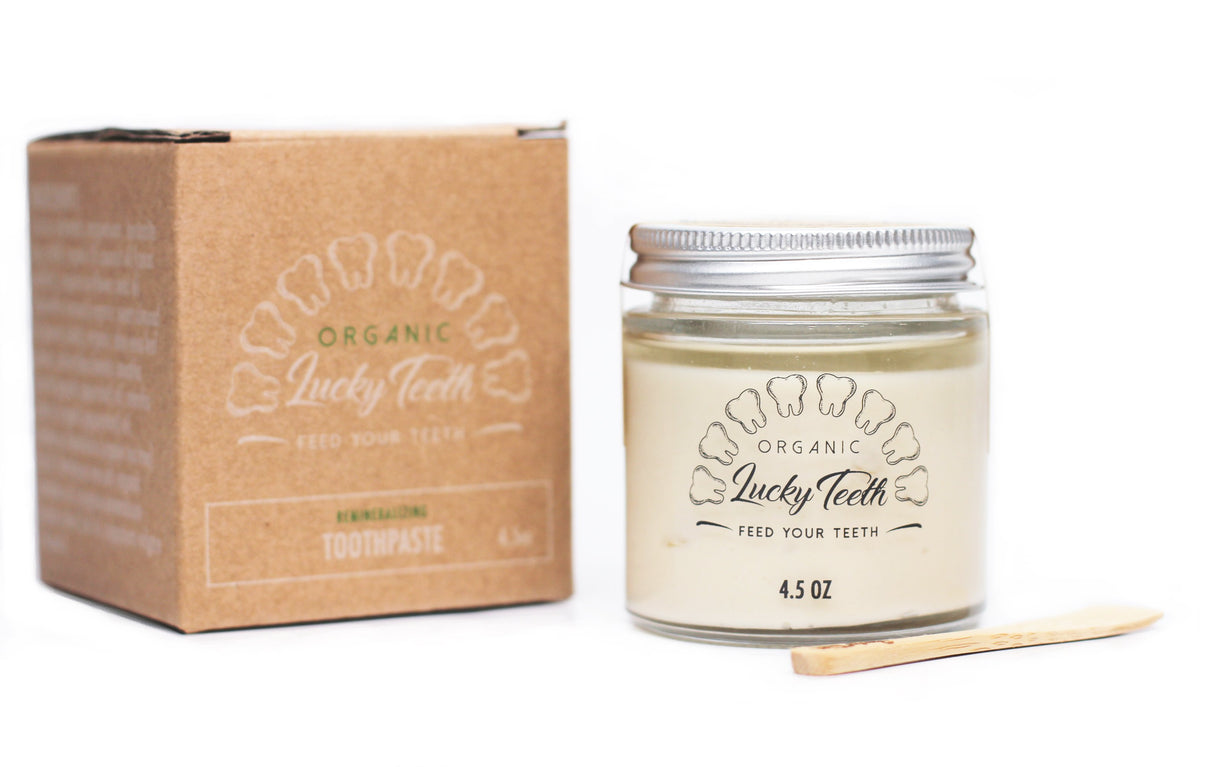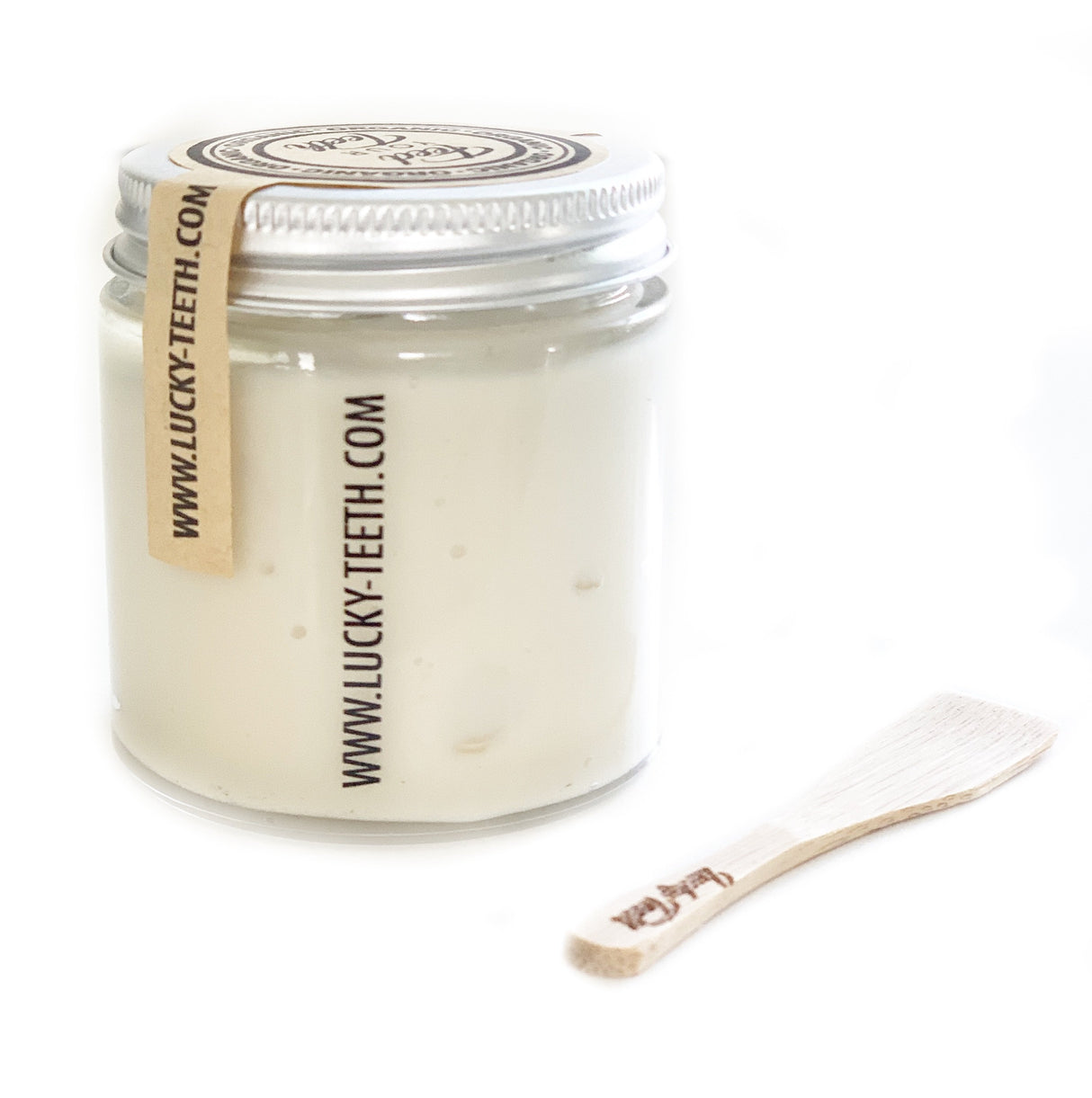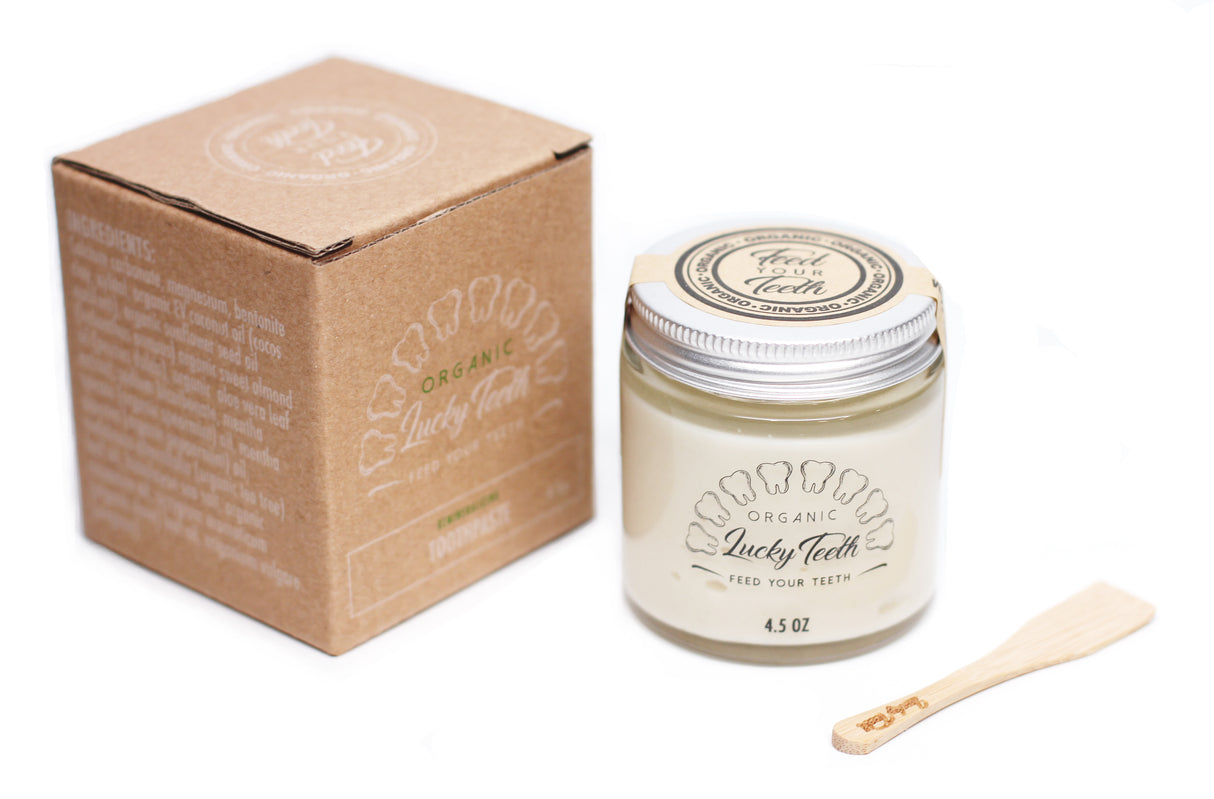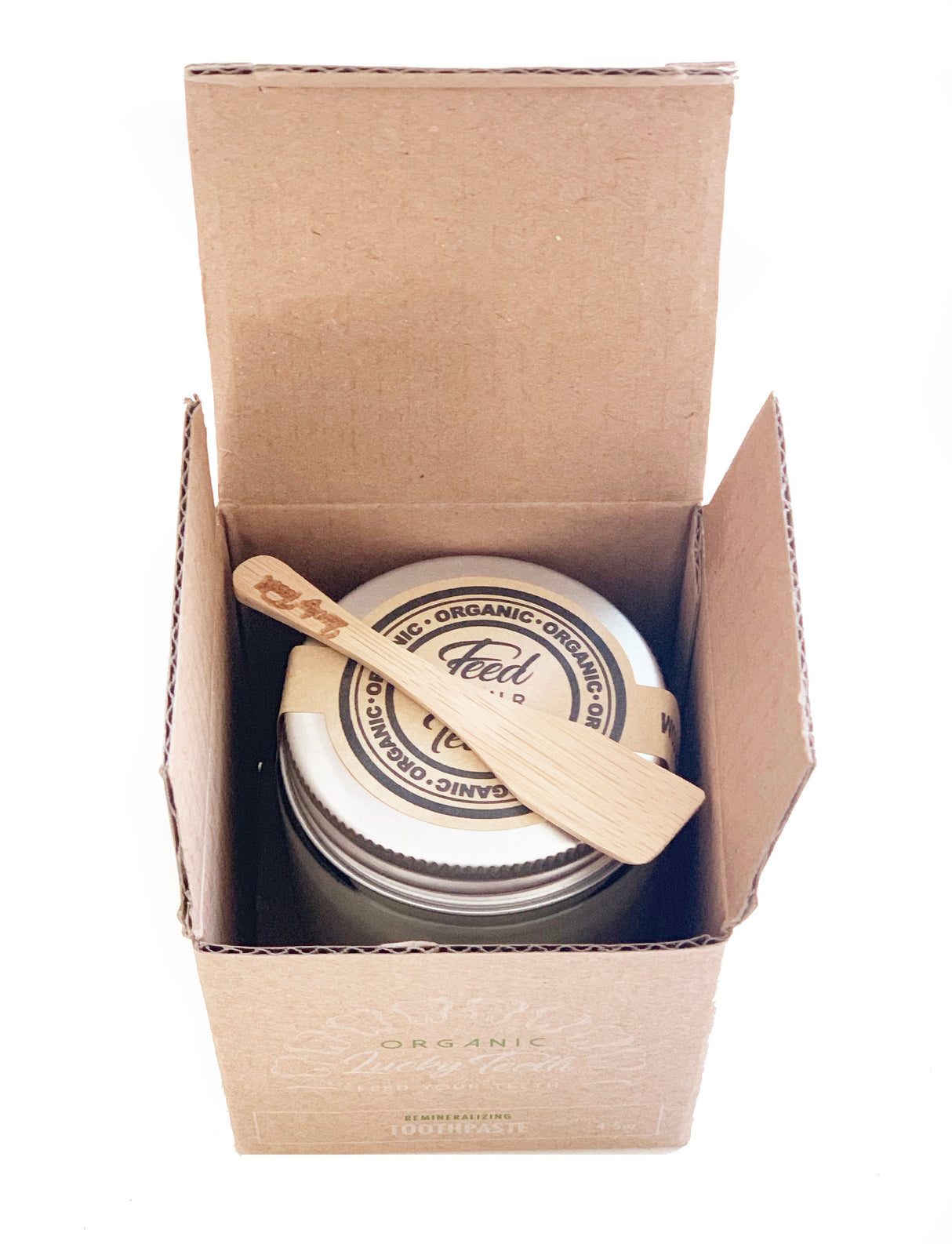Organic Remineralizing Toothpaste in Glass Jar - Fluoride Free Toothpaste
- 2 oz 1 Pack
- 2 oz 2 Pack
- 4.5 OZ 1 Pack
- 4.5 oz 2 Pack
Organic Remineralizing Toothpaste in Glass Jar - Fluoride Free Toothpaste - 2 oz 1 Pack is backordered and will ship as soon as it is back in stock.
Couldn't load pickup availability
Description
Description
Orders placed before 11 am, ship the same day
ORGANIC REMINERALIZING TOOTHPASTE IN A JAR IS GOOD FOR:
Daily care of teeth and gums, swollen gums, toothaches, teeth whitening, teeth Remineralizing, bad breath
INGREDIENTS
Calcium carbonate, magnesium, bentonite clay, xylitol, organic EV coconut oil (Cocos Nucifera), organic sunflower seed oil (Helianthus Annuus), organic sweet almond oil (Prunus Dulcis), organic aloe vera leaf extract, sodium bicarbonate, mentha spicata (organic spearmint) oil, mentha Piperita (organic peppermint) oil, melaleuca alternifolia (organic tea tree) leaf oil, Himalayan sea salt, organic cinnamon oil, Syzygium aromaticum (organic clove) leaf oil, origanum Vulgare (oregano) oil.
Size: 2 or 4 oz
Weight: 4.7 oz & 9 oz
HOW TO USE ORGANIC REMINERALIZING TOOTHPASTE:
1. Mix paste well with a spatula if any oil is visible on the surface.
2. Place a pea-size amount on the toothbrush (*Soft bristles recommended for gum health).
3. Brush teeth until on a sweeping motion from the bottom of tooth up and from top of the tooth down including part of the gum line.
4. Rinse very well with water.
5. Follow with Lucky Teeth Mouthwash.
Enjoy your beautiful healthy teeth!
You can Reuse the jars cleaning them very well after being used, rinse with vinegar to remove residual oil. Store seeds, jewelry, any small thing that works!
- LET’S GO DEEPER…
A combination of nature’s best ingredients to nourish your mouth by balancing natural bacteria, fortifying teeth and gums, removing stains on teeth, and feeding them daily with minerals.
We use certified organic ingredients, every ingredient has a benefit to your mouth.
Minerals bind to the tooth surface to aid in the remineralization of the enamel, decreasing the risk of cavities.
Extra virgin coconut oil
A proven antibacterial and detoxifier clean your teeth, gums, and tongue extracting toxins and bacteria out of it. It’s known to reduce diabetes, heal gingivitis, and even reverse tooth decay.
Aloe vera oil
Eliminates pathogenic oral microflora—disease-causing bacteria—in the mouth. This oil has exhibited anti-viral, anti-bacterial, anti-fungal, and anti-inflammatory properties. Quidy substance in its leaves is the most valuable part of the plant. Active ingredients include vitamin B12, magnesium, manganese, copper, zinc, calcium, potassium, folic acid, sodium, chromium, selenium, and amino acids.
Oregano oil
Oregano oil is a powerful natural antiseptic, penetrant, and bacteria killer. It contains thymol, which is widely used to combat bad breath and plaque. It can be more powerful than prescribed antibiotics against certain bacteria. By using a single drop on your toothpaste or in your mouthwash, you can very effectively eliminate a lot of the damaging bacteria in your mouth.
Tea tree oil
A well-known natural disinfectant and has been used for years in the medical and dental professions as an effective antiseptic that is active against many bacteria, virus,es and fungi, including some that are resistant to antibiotics.
Clove oil
Antiviral, antibacterial, antifungal and an amazing antioxidant, the highest antioxidant essential oil. It is approved by the Dental Association for use as a dental anesthetic.
Cinnamon oil
Antifungal, antibacterial, antiviral, anti-inflammatory, antioxidant. It has long been used for its medical properties and in the oral care industry cinnamon oil is used for its greatest antimicrobial potency against streptococcus mutans, which is responsible for tooth decay and lactobacillus plantar, which causes gingivitis.
Peppermint oil and spearmint oil
Powerful anti-oxidants are often said to help against mouth infections, gum problems and bad breath. With a sprite, minty smell and taste. It contains menthol, menthone, cineole, b-caryophyllene, and limonene, all of which make it very effective at destroying anaerobic bacteria, which thrive in the low oxygen environment of the mouth, causing gum disease and gum inflammation. Peppermint oil is also commonly used for the treatment of the common cold, sinus infections and a sore throat
Baking soda
Contrary to a widely held belief, baking soda is the least abrasive agent (apart from plain water) one could use for tooth brushing. Due to its alkalinity (high pH 8) will neutralize the acids in the mouth (a major cause of tooth decay), kill germs, mop up unpleasant odors and thus help sweeten your breath and keep your gums healthy.
Sweetened with xylitol who has become popular in dental preparations recently due to cavity-fighting properties. Its effectiveness can be compared to that of fluoride but without the potentially harmful effects of swallowing fluoride.
Bentonite Clay
Has been used for centuries to help detoxify the body. When consumed, it absorbs toxins, impurities, heavy metals and other internal contaminants. Bentonite clay is also used in Lucky Teeth Toothpaste for it’s very mild abrasive properties to help scrub and polish the teeth, and reduce pain and inflammation.
We Provide Reusable Glass Jars For a Healthy Environment
We started offering glass jars and zero-waste packaging to produce less impact on the Environment, its a road on which we have embarked and hope to become more and more sustainable. On Essentials we use every day, it is extremely important that Packaging is refillable, reusable, or recyclable. This will ensure less waste accumulated in our landfills.
All starts with the small actions we can change!
SOME QUESTIONS YOU MIGHT HAVE…
Brushing or Flossing First?
In The Journal of Periodontology, a study suggests that flossing before brushing has tangible benefits to your oral health. It found that if you floss first, it leads to a reduction in total plaque. Thus, as well as removing more of the harmful bacteria in the mouth. After flossing, if you brush with a natural toothpaste containing essential oils, they will remain in your gums and teeth increasing oils tooth strengthening properties.
So, if you want to supercharge the effectiveness of your oral health routine, it is better to floss before you brush.
Is It Possible To Make Toothpaste at Home?
It is possible to make toothpaste at home. You just need to know what ingredients to buy, how to make it, and the time to actually make it.
Knowing how much of each ingredient to use can be a bit complex and it usually falls to your preference, anyway. Make sure you look for the best quality ingredients. Some retailers sell low-potency essential oils. These may not do well for your toothpaste.
The difference between Toothpowder and natural Remineralizing Toothpaste
Which One Provides Better Cleaning?
Both do a great job at cleaning your teeth and gums, the only difference is the extra benefits and convenience.
Our Toothpaste contains carrier oils like coconut oil, which is extremely cleansing and healing. The potency of the essential oils might also be stronger in the toothpaste. Tooth-powders usually use the powdered “plant”.
Regarding convenience, some might find dipping their wet toothbrush in the powder messy and inconvenient, some might find it enjoyable. The toothpowder is great for traveling, while toothpaste might leak a little.
Harmful Ingredients in Conventional Toothpastes
– Abrasives
– Detergent (1-2%)
– Humectants (10-30%)
– Flavorings, sweetening and colorings agents (1-5%)
– Preservatives (0.05-0.50%)
– Fluoride and other therapeutic agents
1. Titanium Dioxide
There’s a lot of controversy over the use of titanium dioxide in toothpaste. Researchers believe that it’s safe to use because it isn’t being absorbed by the skin. However, it’s totally possible that it may be absorbed by the membrane in your mouth.
Titanium Dioxide is a known carcinogen. You probably don’t want to brush your teeth with it.
2. Triclosan
Another problematic ingredient is triclosan. This ingredient is used as an antibacterial agent. The problem with it is that it’s been known to cause endocrine disruption. The FDA has even forbidden its use in products like soap and washes. Yet they still allow it in toothpaste.
Considering that this ingredient may also lead to antibiotic resistance, it may be a good idea to avoid this ingredient.
3. Parabens
There’s a lot of scrutiny over the use of parabens in products. The FDA is still studying it. Parabens have been known to disrupt hormones which often leads to problems like breast cancer. While minimal parabens don’t seem to have too much effect on the body, it’s the accumulation of parabens that’s the problem.
Parabens can be found in anything from toothpaste to food. Limiting how much you take into your body can help you avoid problems in the future.
4. Binding agents
Some natural toothpaste uses natural binding agents to create a great texture and consistency. Most commonly known is Carrageenan, and Xanthan Gum. Carrageenan is considered a “natural” food additive derived from red algae. Carrageenan can cause inflammation throughout the body.
Xanthan Gum, a food thickener / stabilizing agent used to bind food/products together. Some studies suggest it causing some digestive distress in those who are susceptible by increasing stool bulk, water content, and sugar content.
5. Fluoride
SIDE EFFECTS OF CONSUMING FLUORIDES
- Acute Poisoning
- Birth Defects
- Osteoarthritis
- Bone & Uterine Cancer
- Perinatal Death
- Immune System Suppression
- Gastrointestinal Disorders
- Essential enzyme inhibition
- Lowered IQ (especially in young children)
- Skeletal Fluorosis (leading to brittle teeth and bones)
Should You Use Human Toothpaste for Dogs?
If you’ve made the decision to brush your dog’s teeth, then your next decision should be what toothpaste to use. Many kinds of toothpaste utilize the ingredient xylitol. Our toothpaste does contain it and is not suitable for dogs since it is extremely poisonous to dogs.

